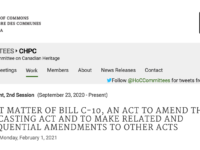The 2019 Liberal election platform made Parliamentary reform a central commitment, promising to “give people a greater voice in Parliament, by improving the way Parliament works.” Yet Bill C-10, the Broadcasting Act reform bill, does the opposite, cutting mandated reviews of policy directions to the CRTC in at least half. The implications of the change are significant since it would mean that House of Commons and Senate committees would not longer review policy directions and Canadian Heritage Minister Steven Guilbeault would be poised to enact his secret policy direction without a full review. I have already written about the surprising secrecy associated with the bill including the failure to disclose how the government arrived at its estimated benefits, the secret content of the policy direction to the CRTC, and the removal of cabinet appeals.
Latest Posts
Afraid to Lead: Canadian Government Launches Timid Consultation on Implementing Copyright Term Extension
After years of rejecting copyright term extension beyond the international law standard of life of the author plus 50 years, the Canadian government caved to pressure from the United States by agreeing to the equivalent of life of the author plus 70 years in the U.S.-Canada-Mexico Trade Agreement (USMCA). As part of that agreement, Canada obtained a 30 month transition period that would allow for consultation on how to implement the copyright term obligation. That consultation was launched late yesterday, with the two departments responsible for copyright – ISED and Canadian Heritage – launching the consultation and a consultation document. The consultation period is very short with responses due by March 12, 2021. The department says that all responses will be made available online once the consultation is concluded.
Why The Secrecy on Bill C-10?: How the Liberals Abandoned Their Commitment to Consultation, and Transparency in Pushing Their Broadcast Reform Bill
I have not been shy about expressing my concerns with the Bill C-10, the Broadcasting Act reform bill. From a 20 part series examining the legislation to two podcasts to a debate with Janet Yale, I have actively engaged on policy concerns involving regulation that extends far beyond the “web giants”, the loss of Canadian sovereignty over broadcast ownership, the threat to Canadian intellectual property, and the uncertainty of leaving many questions to the CRTC to answer. Yet beyond the substance of the bill, in recent days an even more troubling issue has emerged as Canadian Heritage Minister Steven Guilbeault, his Parliamentary Secretary Julie Dabrusin, and the Liberal government abandon longstanding commitments to full consultation, transparency, and parliamentary process.
Conservative MP Files Amendment Calling on the Government to Withdraw Bill C-10
The second reading debate over Bill C-10, the Broadcasting Act reform bill, took a notable turn on Friday as Conservative MP Michael Kram called for the bill to be withdrawn, adding that politicians could do Canadians a lot of good by “rewriting it from scratch.” The House of Commons debate over Bill C-10 has run far longer than the government or Canadian Heritage Minister Steven Guilbeault anticipated with the bill still not passing second reading and receiving a referral for committee study. The Conservatives have become increasingly critical, pointing (as I have done in my series on the many blunders in the bill) to the expansion of powers of the CRTC, the government secrecy on key policy issues, the uncertainty the bill creates, and the increased costs to consumers during a pandemic.
The Law Bytes Podcast, Episode 76: Higher Consumer Costs and Less Choice – My Appearance Before the Heritage Committee on Broadcasting Act Reform
The Standing Committee on Canadian Heritage last week started what it is calling a pre-study on Bill C-10, the Broadcasting Act reform bill. The hearings raises some significant procedural concerns given that the bill has not yet passed second reading so the committee is technically conducting a study about the bill, rather than studying the bill itself. Moreover, committee members have indicated that they have already been invited to provide potential amendment to a bill that hasn’t even made it out to committee, much less been the subject of any study.
Despite those qualms, I was pleased to be invited to appear before the committee and discuss some of the concerns that I’ve identified with the bill. This week’s podcast features my opening statement and the full exchanges that I had with Conservative MP Keven Waugh and Liberal MP Marcie Ian. The audio isn’t ideal, but I hope that the recordings give a sense of both the policy concerns with the bill and the kinds of questions being asked.











